Mysticism keeps men sane. As long as you have mystery you have health; when you destroy mystery you create morbidity. The ordinary man has always been sane because the ordinary man has always been a mystic. He has permitted the twilight. He has always had one foot in earth and the other in fairyland. He has always left himself free to doubt his gods; but (unlike the agnostic of to-day) free also to believe in them. He has always cared more for truth than for consistency. If he saw two truths that seemed to contradict each other, he would take the two truths and the contradiction along with them. His spiritual sight is stereoscopic, like his physical sight: he sees two different pictures at once and yet sees all the better for that. G.K. Chesterton–Orthodoxy
I.
Over the past few years, there’s a place I’ve frequently gone to think. Or rather, not to think. Or not to think in that way; the way required of us to go to work every day, to pay bills, to negotiate living in a city full of others so close that their thoughts become your own for a little while.
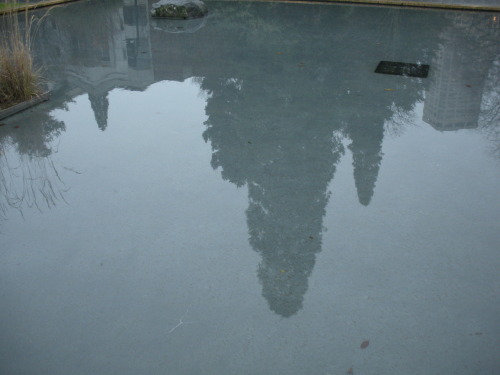
[Credit: R. Wildermuth]
The surface of the water reflects the sky near perfectly; the sort of mirror that we’ve always had before we learned to polish glass. And the reflection, in perpetually sodden Seattle, is grey-blue; greys made of every blue, the ocean of the sky.
I’ve come to this place hundreds of times, at all hours. I work a quarter-mile from the campus where it sits, and I sometimes suspect my job would be much more difficult without the lunch breaks where I sit at its side and forget the stress of being a social worker.
II.
I was gone from Seattle for a year, first on pilgrimage, and then a few months to visit family, and then a few more months in the strange, spirit-drenched town of Eugene, Oregon. I returned early this summer. The pool was one of the first places I made certain to visit, a call upon an old, dearly-missed friend. Like all such returns after distance and time, I feared the place might have changed somehow, or I had changed and would not find it quite as comfortable, quite as sacred and calming now that I’d seen 1500 year-old wells and 4000 year-old standing stones.
Perhaps I would find it to be not quite as numinous, less magical, maybe a mere plastic Disney version of the old world.
But then I saw the undine rising from its waters, the spirit who’d dwelt there long before I ever knew it was there.
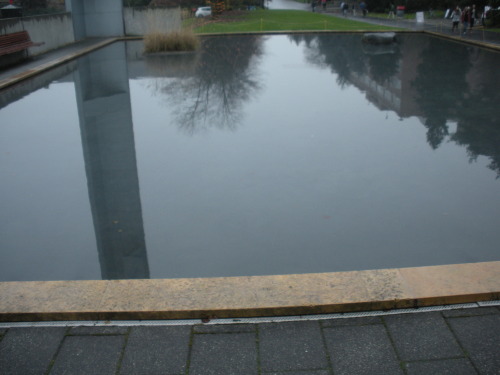
[Credit: R. Wildermuth]
Or maybe, you’ve met one as well; or nymphs or dryads, perhaps one of the Fae, or even if you dared (and also, in my experience, even if you didn’t dare) a god.
To describe precisely what I saw is not exactly easy. “Saw” implies vision, the faculty by which light (and only light) is translated into signals in the human brain. To “see” something, then, is to visually identify the way light reflects and refracts off surfaces, and by this we verify that something is in front of us, or is a certain color, or is a tree or a building.
If that were the only faculty by which we could verify the existence of something, however, no blind person could know anything except as relayed to them by others. I could tell a blind friend there was a step in front of them, and they would have to have faith in my words in order to know this.
But there are other ways of finding out if the surface before you is uneven. Touch works quite well for this as does falling, though the latter is much less preferable. This would be the same if a car was coming at my blind friend. Fortunately, hearing could confirm this fact as well, before the touch of impact was required to verify this truth.
If I am not dishonest, the vision-impaired companion can rely on my statements. And I am no jerk. I would not intentionally trick a blind person at the top of a stairwell.
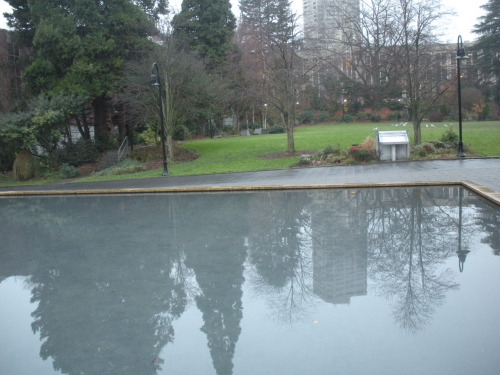
[Credit: R.Wildermuth]
But even among eyes, colors are hardly universal, nor our aesthetic preferences regarding them. Few people I know call a grey sky blue, but I do. Grey clouds seem to me composed of so many blues together that one cannot possibly call them not-blue.
But to speak to someone about all these brilliant and otherworldly blues together can turn, sometimes, into an argument. Someone might only see grey, might ‘know ‘what grey is, might be certain that grey cannot be anything else, or definitely not blue unless it is specifically grey-blue, or blue-grey. If they tell me I am wrong about those blues, I might respond with anger or defensiveness.
“No,” I might say. “I see hundreds of blues which make grey.”
Or more truthfully “I see both hundreds of blues making many greys.”
And if I could not convince that person, it’d be wisest of me to shrug. Perhaps some people just don’t see as many blues as I do, or see grey as some monolithic color and cannot see the myriad of blues behind them.
III.
What did I see at the pool?
With my eyes I saw likely what everyone else sees, though maybe they don’t see so many blues in the grey clouds reflecting upon its surface. I saw the same thing that I “saw” for years, sitting by that pool on lunch breaks, when I needed to think or not to think.
Sometimes I’d take friends there, a lover or another, staring at the sky-on-water while talking, or not talking at all. I’m sure we all saw mostly the same thing, though one or two of my companions hinted about some presence in the pool. It seemed likely; they seemed trustworthy, the sort of people who I’d believe if I were blind and crossing a street or climbing a hill with them.
I didn’t see anything, though. Not till a few months ago.
I didn’t start out trying to see gods and spirits and the dead. The gods just sort of appeared, a sudden presence re-arranging everything in your mind so severely, a flood of different impulses which made me think I was going crazy.
Brighid was like a strange light and constant laughter, the source of which I could never find; a kind and inexplicable warmth from the “universe” around me despite how chill and otherwise despairing my circumstances seemed.
Brân felt like a force or a physical push; a “feeling” of black and red; an occasional unheard voice telling me that the car about to hit me wouldn’t, and the relentless inability not to notice every crow I came upon on the streets.
Dionysos sort of exploded around me in revelry. Everything seems to go “right” when He shows up, but it’s toward something, some meeting, some relentless repeating encounter. Faces change around you. You see a face and also another face. You sit in a crowded room and make sense of the patterned laughter or are alone and feel the trees breathing on you. More than any of the gods I’ve met, he makes words seem no longer to fit, like they’ll collapse under so much contained meaning.
But to say all these things makes me sound “crazy” or it may seem I’m trying to hide my meaning behind too many words. You’ll have to believe me that I’m doing the best I can here.
After so many gods, the Dead might have seemed easy, but they weren’t. When the dead surround you and flow through you, into others to get their attention, you (I mean me) think you are going to die, or think you want to die. There are sudden thoughts of suicide, which were so foreign I knew that they were “outside” me. So many strangers mistake me for someone they knew that even very cynical companions found it bizarre. Then one stranger asks me to take a drive with him so he can tell me about his friend’s suicide, and then others tell me about how I remind them of a dead friend for some reason, and….
There were no dead in my vision. That is, with my ocular senses, I could not “see” the dead. But they were undoubtedly there.
IV.
So…this undine.
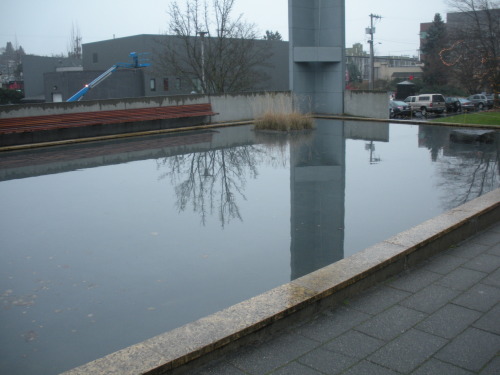
[Credit: R. Wildermuth]
I heard it, though not with my ears, the water spilling off its form back into the pool. I felt the gravity of its presence; the sense of another being nearby, just out of your sight. It’s like the feeling you get when someone stands behind you; the feeling of being watched just before you turn to see them.
And what I “saw?” I saw both the pool without the undine and also the pool with the undine.
I closed my eyes, and it was still there. I opened them, and it was there again.
That “image,” or “sight” or “vision” both utterly surprised me, but also didn’t. I’d been coming to that pool for more than a decade, taking in the presence of the place, finding my mind wandering always to thoughts of otherworldly things, receiving insights and sometimes visions as I watched students interact with it, or the play of clouds upon its surface. Why wouldn’t such a thing dwell in the pool?
I feel little need to convince others of what I’ve seen, because I myself hadn’t seen it for so long. And I don’t always see it, and I don’t think I need to. I know when it’s there and we talk. It tells me things, and I do things for it. But mostly I just sit and listen, and continue to watch the play of light upon the surface of the water.
To see something that isn’t “there” to the eyes is a strange thing. Relying only on our traditional senses, one could certainly suggest I’m making such a thing up, or because no-one else standing with me has “seen” it (regardless of how many have “suspected” it’s there), one could insist that empirical evidence would be needed to verify its existence. Confirmation from independent researchers might work, or perhaps an evaluation of my mental health, the testing the chemical make-up of the water or using other instruments to try to see what cannot be seen with the eyes.
This is where “belief” comes in, but it isn’t what we mostly mean when we speak of belief.
Before I saw the undine, I did not believe there were undines. Enough people I trust had attested to their existence that I suspected it was quite likely. The world that I live in allows for such things, just as it allows for the possibility that there are no such things.
But when I met one, it no longer mattered to me whether or not I “thought” they existed or “believed” they existed. Nor did I need to do much work to fit its existence into what I already understood the world to be.
That is, I don’t “believe” there’s an undine in the pool, but I’m a lot more likely to believe other people when they tell me they’ve met undines in other pools. It’s been the same thing for gods and the dead–I no longer start from a place of doubt or need to translate their accounts into something more palatable to my own understanding of the world.
I choose to accept their existence, having seen one myself.
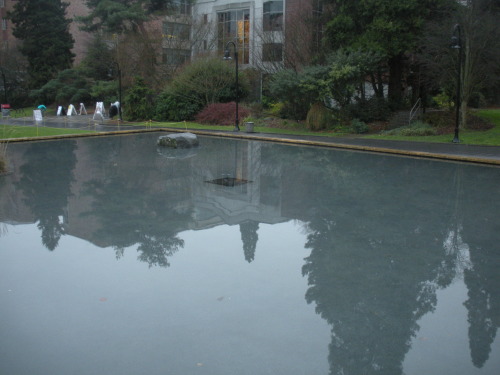
[Credit: R. Wildermuth]
V.
Others might believe it’s there too, even if they do not get such a clear vision of its presence. Perhaps reading this, you accept my story as-is, finding it comparable to experiences of your own. Or you’ve already formulated your commentary; your way of transcribing my experience to fit into your idea of what the world is, to seal off my aberrant experience into wishful thinking, mental instability, or just grand poetic metaphor.
Or maybe, hopefully, you’re inspired to go sit for years by the reflective surface of a sacred pool to meet one, too.
My experience is likely not your experience, and that’s fine. Also, the consequences of the existence of this particular undine matters little to the everyday lives of most people. My life’s rather enriched by meeting it — the conversations we’ve had and the gifts we’ve given each other have certainly made my world much larger.
But it makes me wonder. When others tell me things I haven’t experienced, how often do I seal off or quarantine their accounts so they do not change my beliefs on how the world works?
How much do we do this even with experiences of humans to with other humans, let alone the Otherworld?
When a black friend tells me they get harassed by cops daily, do I accept their account as true, or do I dismiss it because I don’t want to accept the implications of such a world? When I hear people telling me that America is a very racist place, do I discount their stories because I’m white and don’t experience it first hand?
I’ve seen black friends and First Nations friends get harassed by police. Once, a bi-racial friend of mine was thrown to the ground in an intersection as police with assault rifles aimed at him (mistaken identity, they told us later). We stood, unable to help him. My gay friend started filming, and I stood helpless as a police officer bashed his head against a wall, shouting, “I said stop filming, faggot.”
So, I guess it’s a little easier for me to accept the accounts of others, even if I’ve never personally been victim to that violence. My world is big enough to comprehend such a thing occurs, and I do not need to dismiss others’ stories, even if I haven’t witnessed their experiences.
Violence against blacks is much more common than seeing undines, unfortunately, but should be easier to believe.
The Wild Hunt is not responsible for links to external content.
To join a conversation on this post:
Visit our The Wild Hunt subreddit! Point your favorite browser to https://www.reddit.com/r/The_Wild_Hunt_News/, then click “JOIN”. Make sure to click the bell, too, to be notified of new articles posted to our subreddit.
Part V really is a separate essay, and yet it flows naturally and logically from the first four parts. I need to save this for when I get questions on “how do I learn to see the Gods?”… and for when I get people insisting “this is a color-blind society”.
This is brilliant on both counts. Thank you.
This was a very insightful and extremely intelligent essay. Thanks very much for sharing it.
Otherwise, I am always a bit jealous when I hear stories from people who felt/met/experienced spirits/gods/ghosts. In more than a quarter of a century I’ve never had this kind of experience, but I would be willing to accept at least some of those accounts considering they come from people I know and trust. I guess there are some people who have a better “vision” for those things.
This also reminded me: a couple miles from where I live there’s a huge dam which
provides drinking water to town. I used to go there at least once a year, because if you walked high enough (700 meters or so), beyond the dam-pool there always is some glacial formation that remains, even in the summer, and some tiny pounds/lakes created by the melting ice. I used to make some offerings there but I haven’t picked up doing it since I left (and came back) from Iceland. This article most certainly motivates me to o back there, so thanks for that as well!
A really fine piece of work, Rhyd. Sensitive, intelligent, perceptive, and weaving dimensions of the secular and sacred together very insightfully.
Wonderful.
Thank you do much for writing this. Your experiences are a kin to my own, which delights me. Isn’t the multiverse an amazing place? LOL! May we all dare to dwell in beauty, balance, and delight.
This is wonderful–talking about color-blindness (and its opposite) in the literal visual sense to then talk about what is going on more widely in our very messed-up society…
But, as an aside, let me compliment you on your Celticity in your discussion of grey-blues and such. Old Irish has a wonderful word, which is tough to translate easily, which is glas, which can mean blue, green, or grey…so, in essence, any color that the sea can seem, or “the color of sky reflected in sea,” as it is very nicely done in your photos here. In Modern Irish, glas is just “green” (though there are other color words for “green”), and blue and grey also have their own words. Interestingly, because the color “black” (dubh) had moral implications for the medieval (and earlier) Irish, when they started encountering Africans on a regular basis, they used the phrase fer gorm, which pretty much means “blue man,” to talk about them because they didn’t think it right to negatively countenance an entire continent’s population with their already-loaded color terminology. English usage has never been that sensitive, unfortunately…
Blámaðr was also the name of Black people in Old Norse-Icelandic. Svartr meant purely Black but Blá meant “Artificial” Black, so dark Blue/Purple/Brown.
I’m always interested in the anthropology of color perception and names–thanks for that added bit of data!
This is one of the very best columns *ever* to appear on The Wild Hunt, Rhyd. Beyond perception through our ordinary senses we may at times experience an unmediated, direct perception of our surroundings, of our world, even of our entire universe unlimited by the limits of time and space. All things so perceived are perfused with beauty, but also with terror. “Go, go, go, said the bird. Human kind / cannot bear very much reality.” (T S Eliot) And then you return, remade, to the world that you share every day with all other humans, to the ordinary duties you have every day toward them, and to your ordinary joys and sorrows in the work of the every-day world. But always you remember what you once perceived without and beyond your ordinary senses. And that is sufficient unto the day …
I have met/experienced two entities that I believe are gods, and several who I consider place spirits (landvaettir). And it is much like this, where the senses of the physical presence and the physical Presences are much in a state of superposition (except in one case, but I think that being hit with a bolt of lightning, literally, tends to dispel any sense of normalcy, at least for a little while).
Bravo. The whole essay is compelling and already spurring discussion in my seminary class. The fifth movement is a tour de force.
It is called ‘The Sight’ and I have it as well and yes most think I am crazy but that doesn’t matter because once you have ‘seen’ you can never go back to not believing. Fantastic post! Lifts the blinders off the eyes and sort of forces one to actually look at what we know is there but are afraid to admit we can see. Faerie Blessings, Rhyd.
I wonder why there aren’t any more comments on this article. I hardly read a finer prose on TWH…
Very nice transition from the magical to the “real world” via the metaphor of sight.
My son sees ghosts and spirits of ordinary people all over. Double-sided gift–he doesn’t know how to help them heal and move along. My sister dreamed true–but only about disasters–in her youth.
I envy you the undine. Does she sit on the boulder at times?